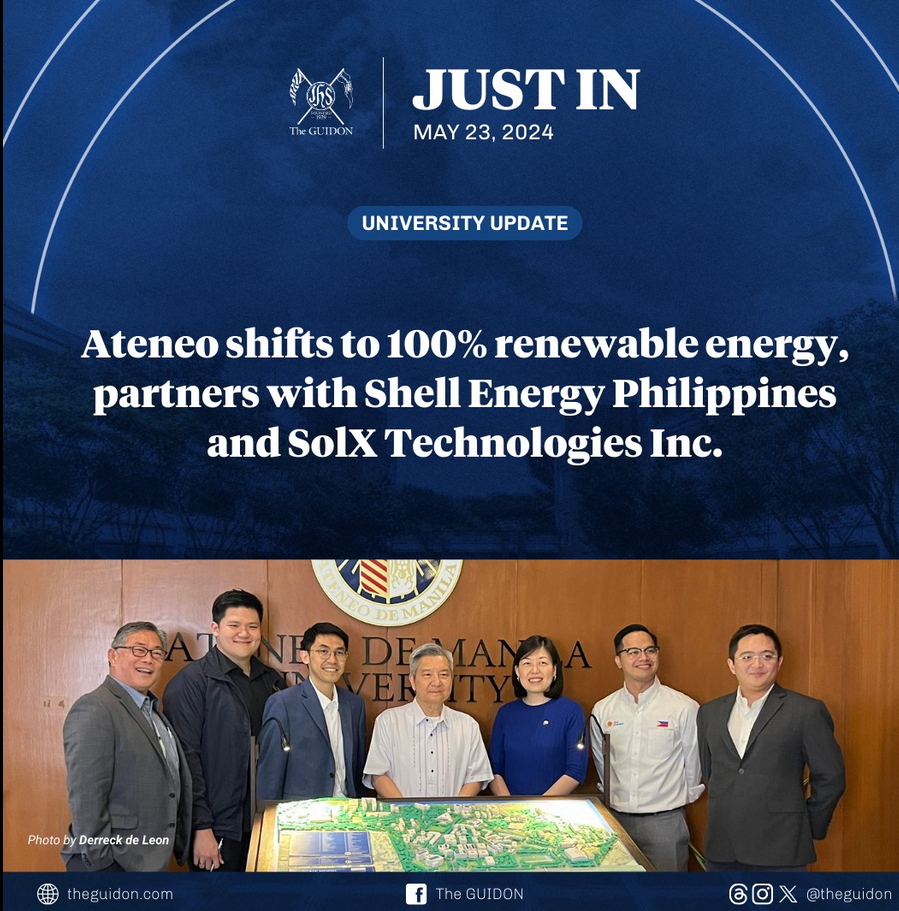The kids are alright, but universities need to support them—and ditch fossil fuel criminals.
If there’s one thing the recent events at Ateneo de Manila University (ADMU) and Nanyang Technological University (NTU) in Singapore have shown us, it is that the kids are alright. Reacting to their respective university’s partnership with big oil, students have come out to publicly denounce sordid deals with climate polluters Shell and ExxonMobil.
Last May 24, ADMU announced that they were going 100% renewable (energy)—with the help of Shell. In April, NTU launched a partnership for a laboratory for low-carbon solutions with ExxonMobil. On the surface, the objectives seem commendable, but one doesn’t need to delve deeper to know that the school administrations are partnering with oil and gas companies that have accounted for a lion’s share of historical carbon emissions which is causing today’s climate crisis. In other words, they have blood on their hands.

Good thing the students have spoken out. ADMU’s student council of the School of Science and Engineering has issued a formal statement, saying: “the partnership between Ateneo de Manila and Shell Energy Philippines, as it currently stands, is seen as contradictory to the principles of Laudato Si’ and the University’s commitment to environmental sustainability and climate action.” Their statement cites the Philippine Commission on Human Rights’ final report on the National Inquiry on Climate Change that stated that companies, including Shell and ExxonMobil, are morally liable, and can be held legally liable, for human rights harms arising from climate impacts 1.
Meanwhile, NTU’s student movement, NTUDivest spoke out more strongly: “Without evidence, and given past records, we doubt there is a genuine intention to do something for the climate. So we do not buy into what they are saying at all.” “We will continue to publicly call it out. We will continue to make ourselves heard, to amplify our messages that such dubious partnerships are untenable, and as students and stakeholders in this university, we will not stand for it.”
But what exactly is this fuss about? Put simply, not only are these “climate projects” coming from oil and gas companies most responsible for climate emissions in the first place—it’s coming at a time when these companies are expanding their fossil fuel business and reneging on their climate commitments. An expansion that, if left unchecked, threatens millions of lives from deepening inequalities brought about by climate impacts, not to mention the already-piling damages and loss of life across the world because of worsening and more unbearable changes in the climate.
To put this in perspective, in 2022, as scientists were calling for the immediate phaseout of fossil fuels in order to prevent runaway climate change, these fossil fuel companies announced record high profits. ExxonMobil raked in USD 56B in net profits—the biggest in its entire corporate history, and Shell USD 40B, also a record high. At the time of their announcements, a study showed that global climate damage costs soared to USD 360B.
In the Philippines, year in and year out, we lose billions from damages, on top of human casualties and millions of displaced families, to extreme weather. The latest study says that the Philippines is the most economically exposed country, losing 3% of GDP (around USD 12 billion) annually, while being exposed to hazard intensification in the future.
Pope Francis himself has called for an end to fossil fuels, aside from the Encyclical Letter Laudato Si (on “care for our common home”) as early as 2015. Ateneo’s administration is courting the devil by taking greenwashing money, and deciding without open and inclusive dialogue with the most affected stakeholders in the school. This has been a growing source of discontent among the student body in the past few years. As an alumnus looking in, Ateneo has become as corporate as its climate criminal partner.
One has to wonder what values Ateneo is trying to teach its students as they send off their graduates to a climate changed world. Is it suggesting that it is okay to decide without “listening to the cry of the earth and the poor?” To transition no matter the cost and the message it sends? To normalize hypocrisy by embodying unchecked corporate power while employing costly marketing tactics?
Students and the youth are—rightfully—standing up, and showing that even in a world where the odds seem stacked against them, they are taking control of their future: in climate strikes, in the youth climate movement, and in climate litigation, they are holding fossil fuel companies accountable.
Universities need to realize that by being party to greenwashing, they are helping legitimize the immorality of fossil fuel extraction that puts profit before the welfare of people and nature. They are endorsing business activities that deepen poverty and injustice, and reinforcing the impunity of oil and gas companies. University administrators must instead take the cue from students and the youth toward genuine societal transformation—they need to join students in calling for corporate accountability and calling out big oil to stop all fossil fuel expansion, commit to a just transition, and pay up for the economic and non-economic loss and damages caused by climate impacts. And it begins by divesting from fossil fuels and refusing sponsorships and partnerships with them, which some universities like Mapua have already done as early as 2021.
Today’s youth are fighting to create the safer, better, greener and more just world they deserve. Universities like Ateneo, who hold so much responsibility in shaping the next generation of leaders, must listen and learn from the very people it claims to form as men and women for others.
Notes:
1 Commission on Human Rights of the Philippines. (2022). National Inquiry on Climate Change Report, 103.
